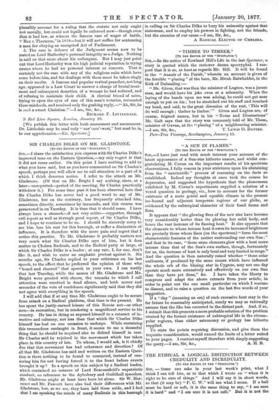SIR CHARLES DILKE ON MR. GLADSTONE.
(TO THE EDITOR OF THE "SPECTATOR.")
share the satisfaction you express with Sir Charles Dilke's improved tone on the Eastern Question,--my only regret is that it did not come earlier. On this point I have nothing to add to what you have said, but as you have commented on Sir Charles's speech, perhaps you will allow me to call attention to a part of it which I think deserves notice. I refer to the attack on Mr. Gladstone. (Of that on Mr. Bright I say nothing, since, at a later—unreported—period of the meeting, Sir Charles practically withdrew it.) For some time past it has been observed here that Sir Charles Mike has never had a good word to say of Mr. Gladstone, but on the contrary, has frequently attacked him, sometimes directly, sometimes by innuendo, and this course was persevered in on Tuesday. It is time that it should cease. I have always been a staunch—if not very active—supporter, through evil report as well as through good report, of Sir Charles Dilke, and I hope to continue to be so. I should be sincerely sorry to see him lose his seat for this borough, or suffer a diminution of influence. It is therefore with the more pain and regret that I notice this practice. To Mr. Gladstone it probably matters not very much what Sir Charles Dilke says of him, but it does matter to Chelsea Radicals, and to the Radical party at large, of which Sir Charles Dilke is a leader ; at any rate, I, for one, don't like it, and wish to enter an emphatic protest against it. Six months ago, Sir Charles replied to your criticisms on his last speech, to the effect that he preferred the opinion of those who "heard and cheered" that speech to your own. I can testify that last Tuesday, while the names of Mr. Gladstone and Mr. Bright were greeted with cheers, the remarks to which I call attention were received in dead silence, and both mover and seconder of the vote of confidence significantly said that they did not agree with everything in the speech.
I will add that if at any time Mr. Gladstone ought to be secure from attack on a Radical platform, that time is the present. He has spent the justly-earned leisure of this Recess not—as other men—in recreation, but in rendering a magnificent service to his country. He has in doing so exposed himself to a cataract of in- vective and calumny, not less than that which Sir Charles Dilke himself has had on one occasion to undergo. While sustaining this tremendous onslaught in front, it•seems to me a shameful thing that he should be required also to defend himself in rear. Sir Charles said he rejoiced in the movement which has taken place in this country of late. To whom, I would ask, is it chiefly due that that movement has had coherence and direction? Of all that Mr. Gladstone has said and written on the Eastern Ques- tion is there nothing to be found to commend, instead of cen- suring him for not having forced it to the front before events brought it up ? In a speech on this subject by a Radical leader, which contained no censure of Lord Beaconsfield's unpatriotic conduct, no reference to the Aylesbury and Guildhall speeches, Mr. Gladstone might at least have been let alone. Sir W. Har- court and Mr. Fawcett have also had their differences with Mr. Gladstone, but, as we see, they have laid them aside, and I feel that I am speaking the minds of many Radicals in this borough
in calling on Sir Charles Dilke to bury his animosity against that statesman, and to employ his powers in fighting, not the friends, but the enemies of our cause.—I am, Sir, &c., A RADICAL ELECTOR OF CHELSEA.


































 Previous page
Previous page